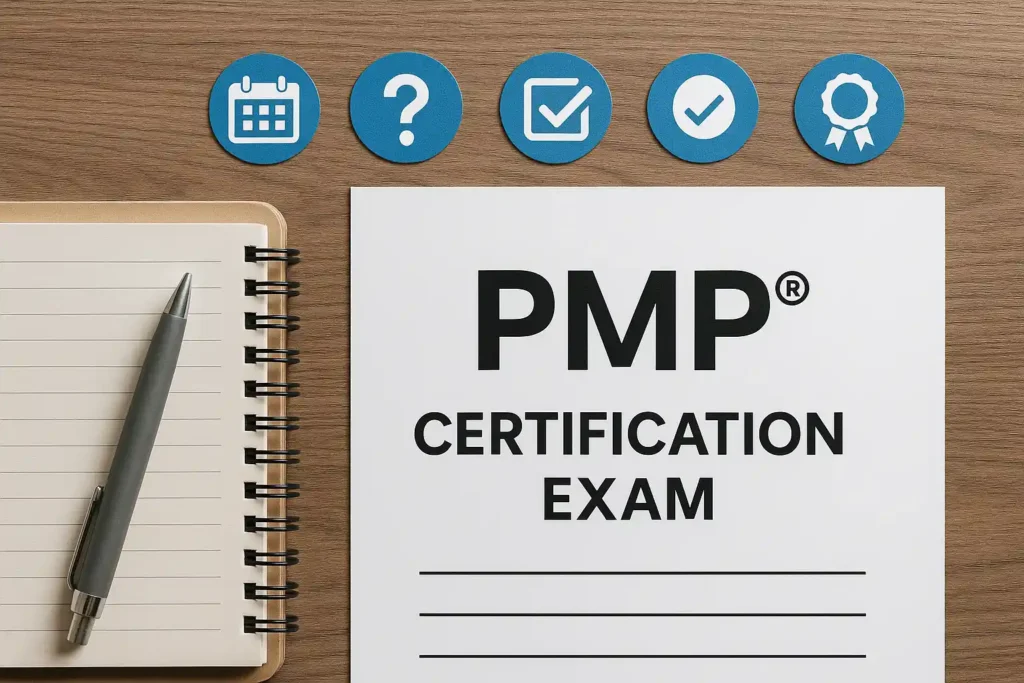Your Guide to the PMP® Certification Exam: What to Expect and Why It Matters
Author: Alvin Villanueva, PMP®, PMI-ACP®; Editor: Geram Lompon; Reviewed by: Grace Payumo, PMP®
There comes a moment when you realize you’re already doing the work, guiding teams, owning outcomes, balancing the pressure of deadlines with the precision of delivery. But without the title, the recognition, or the global credential to back it up, your potential might still be underestimated.
That’s where the PMP® certification exam comes in.
Whether you’re a project manager, team lead, analyst, coordinator, or technical expert, this milestone marks your evolution from doer to recognized leader.
It evaluates your ability to lead projects using predictive, agile, or hybrid approaches. It isn’t about definitions. It’s about proving you can make smart decisions in motion, adapt under pressure, and drive consistent value.
While it’s tailored for experienced project managers, the PMP® is also an exceptional opportunity for professionals with a CAPM® certification or extensive cross-functional experience who are ready to lead at a more strategic level.
Why the PMP® Exam Is More Than a Credential
If you’re exploring growth in
Issued by the
According to the Project Management Institute’s Earning Power: Project Management Salary Survey (PMI®, 2023), PMP certification holders report a higher median salary than non-PMP members, highlighting the credential’s industry recognition and influence in competitive hiring environments.
What to Expect From the PMP® Exam Structure
The exam includes 180 multiple-choice exam questions across three domains:
- People (42%) – leadership, conflict resolution, and team development
- Process (50%) – planning, risk, scope, schedule, cost, and quality management
- Business Environment (8%) – strategic alignment, benefits realization, and change impact
You have 230 minutes to finish the exam with two optional 10-minute breaks. Every question reflects real-world challenges. Think less about textbook answers and more about what you would do.
Understanding the structure of these three domains is more than just preparation. It’s your roadmap for how PMI expects professionals to think and lead.
What Are the PMP® Certification Requirements?
Before applying, you must meet specific PMP Certification Requirements based on your educational background and
If you have a four-year degree (bachelor’s degree or global equivalent):
- 36 months of leading projects (non-overlapping)
- 35 contact hours of
project management education or a Certified Associate inProject Management (CAPM)
If you have a high school diploma or an associate’s degree:
- 60 months of leading projects (non-overlapping)
- 35 contact hours of
project management training or a CAPM certification
You can fulfill the training requirement through PMI-approved programs or a reliable PMP course bundle such as the one offered by ROSEMET, which combines real-world scenarios with exam-aligned content to help you prepare confidently.
How to Prepare Effectively for the PMP® Certification Exam
PMP exam preparation is more than memorizing processes. It’s about understanding how to apply skills across industries, teams, and timelines.
Many candidates dedicate 2 to 3 months to studying, using tools such as diagnostic quizzes, simulated exams, and personalized study plans. Reviewing the PMBOK Guide and Agile Practice Guide is key, especially when paired with real-world application, but keep in mind that PMP exam questions are based on the PMP Exam Content Outline (ECO), which covers predictive, agile, and hybrid approaches.
These references are part of the official
Structured programs help focus your efforts. Options like ROSEMET’s PMP Course Bundle are built around these essentials and can shorten the path from preparation to passing. These tools also help you complete your study cycle with greater focus and measurable progress.
Innovative Strategies to Avoid Burnout While Studying
To pass the exam without burning out, structure your study time with intention:
- Use a PMP prep course aligned with the latest exam outline
- Take regular practice exams under timed conditions
- Mix learning methods: read, watch, discuss, and reflect
- Focus on scenario-based questions similar to what appears on the actual test
Cramming rarely works. Instead, aim for comprehension.
The exam rewards candidates who can navigate complexity with calm and clarity. You want to feel fully prepared before test day.
What Does the PMP® Exam Cost and Why Should You Act Now?
United States pricing (as of August 2025): the PMP exam fee is $425 USD for PMI members and $675 USD for non-members (Project Management Institute, 2025).
PMI membership costs $139 USD for the first year and includes access to the PMBOK Guide, Agile materials, global peer forums, and discounts on training.
The price difference alone makes PMI membership a smart move. With potential fee changes ahead, applying now lets you lock in a lower cost and access exam prep tools sooner.
When you compare what you pay to the opportunity you unlock, the return is clear.
How to Apply for the PMP® Certification Without Getting Lost in the Process
The PMP application process is simple but requires attention to detail. You’ll need to submit:
- Your educational background
- Your
project management experience - Proof of 35 contact hours of
project management education or a CAPM certification - Your agreement to PMI’s code of ethics
PMI may audit your application. If that happens, provide documentation such as signed experience verifications or course certificates.
Once approved, schedule your exam through Pearson VUE, either online or in person.
What Happens After You Pass the PMP® Exam
You’ll receive unofficial results immediately. Within days, PMI will send confirmation, your digital certificate, and a credential verification link. You’ll also receive the registered marks, which confirm your official status as a PMP.
You can now use the PMP title on your resume, digital profiles, proposals, and business cards. It signals your expertise in project leadership and your readiness to drive strategic value.
How to Maintain Your PMP® Credential and Keep It Working for You
To maintain your certification, you must earn 60 professional development units (PDUs) every three years. These can come from:
- Training courses
- PMI webinars and events
- Presenting or mentoring in project management
- Volunteering in professional communities
This ongoing process helps keep your skills current and shows your long-term commitment to the field. PMP certification holders are expected to make meaningful contributions as the industry evolves.
Why the PMP® Stands Out From Other Certifications
The PMP certification is widely recognized across industries as a trusted measure of
It also proves your familiarity with predictive
In fields such as information technology, engineering, and finance, it offers an edge, as employers prioritize performance and industry recognition. This credential serves as a foundation for advancing your career in high-stakes projects.
What Makes the PMP® a Career-Changing Credential
If you want your
It’s not just a badge. It reflects leadership, strategy, and execution. The other half of success, beyond experience, is being credentialed to speak the language of strategic delivery.
With the PMP, you become part of a global network of certified professionals trusted to lead.
Final Thoughts on the PMP® Certification Exam
The PMP certification exam represents more than a professional milestone. It’s the beginning of a more focused, strategic, and influential version of yourself.
Whether you’re pursuing higher salaries, greater responsibility, or a more senior position in a high-demand job market, this credential demonstrates that you’re ready to take the lead.
By choosing thoughtful preparation and leveraging tools like ROSEMET’s PMP Course Bundle, you give yourself every chance to succeed and to grow into the
References
Project Management Institute. (2025). PMP certification handbook. https://www.pmi.org/certifications/project-management-pmp
Project Management Institute. (2023). Earning power: Project management salary survey (12th ed.). https://www.pmi.org/learning/careers/project-management-salary-survey

